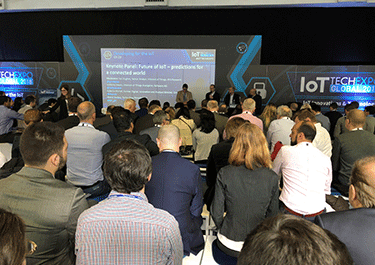 Over 12,000 people from the world of technology descended into London last month for a conference focusing on the emerging technologies of IoT (Internet of Things), blockchain and artificial intelligence (AI).
Over 12,000 people from the world of technology descended into London last month for a conference focusing on the emerging technologies of IoT (Internet of Things), blockchain and artificial intelligence (AI).
The three areas were co-located under one roof at the Olympia Grand in Kensington, which also brought together over 300 exhibitors, 18 conference tracks and 500-plus speakers.
Key topics examined included smart building and facilities management, building the connected supply chain, intelligent city and transport management, smart grid data management and analytics, asset monitoring and management, delivering smart connected new products and more.
Sessions on blockchain covered areas such as practical implications for the technology within businesses, as well as developing applications. Speakers talked about how blockchain is currently out of reach for everyday people due to lack of understanding. So, when developing solutions, don’t forget to make it user-friendly for the average person.
An interesting point raised was that blockchain doesn’t currently have any governance or regulations in Europe, so who is controlling the ledgers? If this issue isn’t addressed, the technology won’t be adopted by certain sectors, who just won’t trust it.
In Europe, IoT solutions are far from being mainstream but are a lot more prevalent in the industrial and agricultural sectors, more so than any others. In those environments, where dealing with heavy machinery and production efficiency is of high importance, they can clearly see the value of IoT solutions to gain deeper analytics of their production lines to help grow their bottom lines.
David Mudd, business development director at BSI Group, which focuses on business standards, delivered a thought-provoking session on delivering IoT solutions. He advised that businesses should embrace IoT solutions as the rewards, such as actionable data and product locating, outweighed the risks. Security is the biggest risk facing these solutions, including hacking into systems to gain control or steal data, but these issues can be overcome by implementing the right systems.
Functionality and interoperability were also considerations that need to be considered when implementing IoT solutions, so it’s important to define your strategy early on. Mudd’s presentation and motto of “think big, start small, act now” resonated highly with the audience.
A common theme at the conference was the lack of standardisation and regulation, which was cited by many attendees. One exhibitor said that the U.K. government was starting to look at regulations around autonomous vehicles but was still as long way off, especially as these vehicles are slated to be on the roads by 2021.
Autonomous vehicles will start to be used more not on public roads, but closed environments such as airports to ferry passengers before being used on motorways, where less things can go wrong. Finally, they’ll be used within cities with heavy traffic and pedestrians, where the risk is higher. Insurance is still a cause for concern as to who should be liable for an accident – the driver, the car or the software provider.
The conference brought some excellent sessions and thought-leadership to attendees in Europe to help them implement these new technologies in their organisations.
Kris Nagamootoo is a senior manager at CompTIA and looks after vendor and distributor members in the EMEA and Australia/New Zealand region. He likes travelling and playing Lego with his three children.
